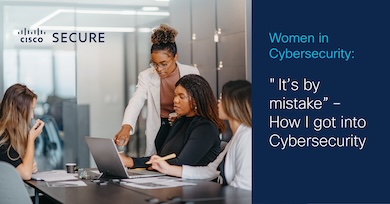It’s by mistake” – How I got into Cybersecurity

Welcome to the Cisco Women in Cybersecurity’s blog series, where we highlight the stories of the mentors who have inspired and advocated for the careers of those in our community. This series seeks to show the importance of allyship, connection, and how different the journeys can be into a career in cybersecurity.
“It’s by mistake”.
That’s what I thought when I first got a call from the recruiter for the Customer Success Manager role at Cisco. Having spent 10 years in software, I didn’t think I had the relevant experience or expertise in cybersecurity. But one conversation with my first hiring manager changed all that.
I recently sat down with that manager, David Salter, and we talked about why he looks for skills “outside of the box”, and the benefits that different backgrounds and experiences bring to the cybersecurity industry.
Gee: Why do you encourage having people from other backgrounds?
David: The whole [customer success] team was, and is, built on complementary skills. We had strong technical people. We also had strong leaders and program managers. Everyone brought different skillsets to achieve our core aim of truly understanding the customers’ challenges. Because we all had different skillsets, we would work together, and with the customer, to resolve their challenges.
We can teach security and technology. But those core people skills, and customer interaction skills, are at the heart of what we do.
Gee: For a job posting there are minimum qualifications, then preferred qualifications. In countries like India, there is a lot of competition, so ticking all the boxes in the job description is tough. What influenced your hiring decision to hire me?
David: You were 1 out of over 1200 candidates for this position, so yes, the competition was incredibly tough. I remember that you had a lot of the skills we were looking for, but really, it was all about that first conversation we had. It was a very natural conversation which, when working in Customer Success, is incredibly important. Every conversation we have with the customer is an opportunity to share and listen.
The conversation was powerful. It was an easy decision to shortlist you, based on you as a whole person, rather than the specific checklist listed in the job description.
Gee: You do a lot of mentoring. Why is this important for you?
David: I benefitted a lot early in career from mentors myself. As I moved into leadership, I discovered it’s not about telling people what to do. It’s about creating an open learning environment. If I share what I know, in an open and honest environment, that encourages others to share, and I learn something new every time.
I still believe that I’ve got new things to learn every day. Mentoring helps me with that, as much as (I hope) it helps the people I’m mentoring. Sharing my own mistakes and challenges helps people address their own challenges. It’s also a great way to give back.
Gee: What are your suggestions for people moving into Cybersecurity from a different domain?
David:. Cybersecurity is such a vast industry, there are so many different types of roles you can do. If you are in a connected part of technology, lets say networking, that’s incredibly relevant for security. If you worked in application development and worked in coding, that’s really useful for security, particularly in the vulnerability space.
There is a Cybersecurity aspect is to every part of IT. It’s not just Firewall and Anti-Virus anymore. We are looking at how a device authenticates to the network, how a user interacts with that device and how they access applications. A good grounding in Information Technology would be very relevant. An understanding of Product Marketing and technical writing can also be relevant…there are so many skillsets that can be adapted to cybersecurity. And the industry needs them.
For somebody starting out, my advice would be to get really curious. Think about what aspect of the industry that fascinates you, and start from there. We should never be scared to think outside of the box.
We’d love to hear what you think. Ask a Question, Comment Below, and Stay Connected with Cisco Secure on social!
Cisco Secure Social Channels
Instagram
Facebook
Twitter
LinkedIn
Share:

